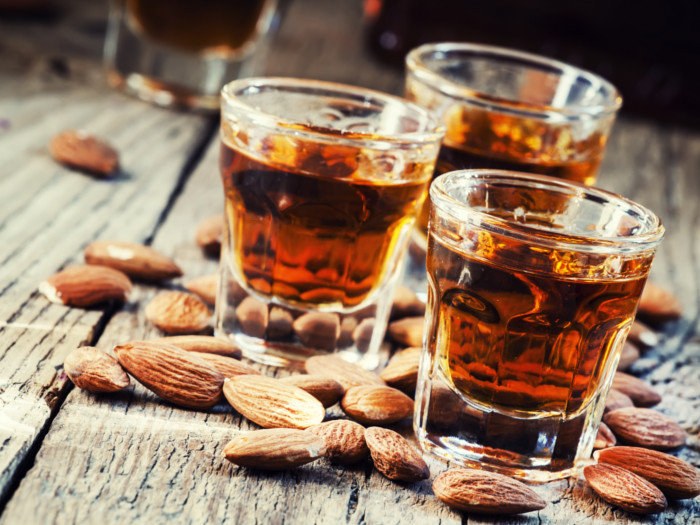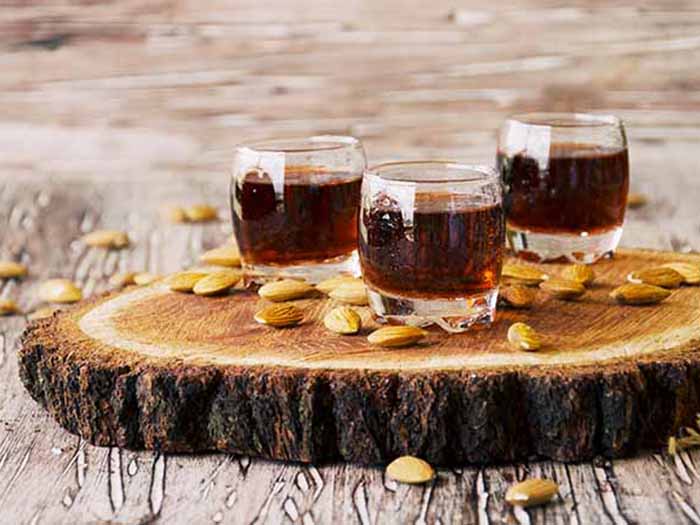Amaretto may be more than just a tasty type of alcohol; it might also pack a few surprising health benefits, when consumed in moderation!
What is Amaretto?
Amaretto is an Italian liqueur originally made from bitter almonds, although now it is commonly also distilled using peach pits, and as such, is a gluten-free beverage. Most amarettos range from 24% to 28% alcohol by volume (ABV), and thanks to the high alcohol content, this alcohol does not go bad quickly. However, a bottle that has been opened for several years may have lost much of its flavor. If you do not have amaretto, non-alcoholic almond extract or hazelnut liqueur can be used as a substitute. [1]
Nutrition Facts
One ounce of amaretto may contain 3 grams of sugar, 17 grams of carbs, and 110 calories. It may not contain any fats, proteins, cholesterol, and sodium.

Amaretto is a liqueur with an almond flavor. Photo Credit: Shutterstock
How to Make an Amaretto Sour?
The process to make an amaretto sour is a simple one. We have discussed the steps below.

Classic Amaretto Sour Recipe
Ingredients
- 1.5 oz Amaretto liqueur
- 0.75 oz lime juice
- 1 oz simple syrup
- 1 orange slice, thinly cut optional
- Ice cubes
Instructions
- Pour the liqueur into a cocktail shaker with ice, syrup, and lemon juice.
- Shake to combine ingredients and let it cool.
- Pour into a glass and place a slice of orange on top.

Substitutes
There are many alternatives available depending on the effect you are looking for.
- Alcoholic substitutes: If you want to include the alcohol but have some flexibility on the flavor, try hazelnut liqueur, chocolate liqueur, or coffee liqueur.
- Non-alcoholic substitutes: If you’re interested in preserving the flavor of this alcohol, non-alcoholic substitutions, such as almond extract, or Italian soda syrup, and marzipan are your best options.
Uses
Amazing uses of amaretto include the following:
- Possibly used most often as an after-dinner drink, either straight or combined into a cocktail, this liqueur adds a sweet and strong flavor to many meals.
- Similarly, it may often be added to desserts, such as tiramisu or cheesecake, or ice cream, to achieve a particular flavor.
- It might also be popular to add to a morning or after-dinner coffee.
Benefits
Although not usually consumed with health improvement as its main goal, amaretto, as with many alcohols, may help with the following: [2]
- May lower stress and anxiety
- Might help reduce the risk of heart diseases
However, alcoholism and binge drinking is detrimental to overall health and can undo any possible good things that moderate amounts can impart.
Risks & Side Effects
Moderation is key. Excessive drinking can also lead to serious health problems, such as the following:
Alcohol can impair your judgment, a particularly dangerous reality when operating heavy machinery. According to the Centers for Disease Control and Prevention, people who should not drink alcohol may include women who are pregnant, individuals younger than 21 years of age, and people who are recovering from alcoholism or cannot control the amount they drink. Also, it should be avoided by people who are planning to drive or any other activity that required focus and skill. However, different countries have different rules on alcohol purchase and consumption. [3] [4]
Cooking with alcohol: Cooking with alcoholic beverages results in only some loss of alcohol content. Foods baked or simmered in alcohol can retain anywhere from 4 percent to 85 percent of the alcohol, according to a study by the U.S. Department of Agriculture’s Nutrient Data lab. [5]

